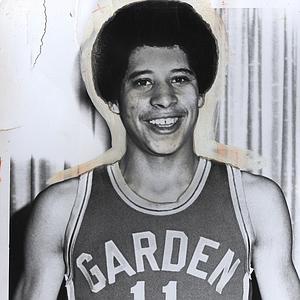


“The Destroyer” a nickname he garnered for crushing opposing defenses. Hammond dropped out of school in the ninth grade, so there are no prep recordings of his accomplishments. Instead, he made his name playing in Harlem summer leagues, most notably the Rucker Tournament. In these games Hammond would battle college all Americans and pro players home for the summer.
And at the end of the day, Joe Hammond was recognized as the best basketball player in NYC by scoring 40 or 50 points a game.
But what Hammond will be known for more than ever is his performance in the 1970 Rucker League championship game. After missing the entire first half, Hammond showed up, outscored Julius Erving 50-39, and was named the MVP of the tournament.
http://www.hoopsvibe.com/nba-gossip-and-rumors/126481-top-five-streetball-players-of-all-time
Nicknamed the Destroyer, for his ability to crush an opposing defense, Hammond never played high school or college basketball, yet, at the age of 19, he had already achieved professional status, and was touted by National Basketball Association scouts as a future star in their league.
"You're talking about a guy who showed up at these tournament games whenever he felt like it and scored 40 or 50 points per game against top professional players," said Adams. "In his day, he was on a par with guys like Dean Meminger and Tiny Archibald, and for his size, he was better than they were."
A 6-foot-3 1/2-inch guard, Hammond was selected by the Los Angeles Lakers in the N.B.A.'s hardship draft of 1971 (a class that included Phil Chenier and Cyril Baptiste), but a contract dispute prevented him from signing with the team. Also, Hammond by then had another source of income: a lucrative drug trade on the Harlem streets.
Even the ABA wanted in on Joe only to be rejected.
Lou Carnesecca, the former coach of the New York Nets in the early ‘70s said: “I can remember sitting at the table, after a nice plate of pasta, and I said ‘Look, I would like to offer [Hammond] a contract, three years, no cut, starting $35,000, $40,000 and $45,000…guaranteed. And the thing that astounded me was that he said ‘I can do better the way I’m doing now.’” He chose that lifestyle and ended up in jail on drug charges in 1971. He was sentenced to 11 years in prison.

"I'm sorry to hear that; it's absolutely terrible ," said Lou Carnesecca, the St. John's coach, who also tried to sign Hammond in the 1970-71 season when he coached the New York Nets in the now defunct American Basketball Association. "Joe had tremendous skills, all of which he learned on the streets, and a great, great future. He was a precursor to Magic Johnson and guys like that.
"I offered him a three-year, no-cut contract, and he wouldn't sign," said Carnesecca. "The A.B.A. was a vagabond league at the time, so I guess he felt he could do better, and that maybe the situation wasn't right for him."
Hammond played one year of professional ball, with the Allentown Jets of the Eastern Basketball Association in 1970, and earned a spot in the league's all-star game. "The 6-4, 180-pounder is one of the most exciting players in the game," reads the last sentence of Hammond's biography in the Jets' 1971 media guide.
"The Jets only payed me $375 a game," said Hammond. "But they only played two games a week, so it was convenient.'
In Harlem, they still talk about a Rucker League championship game in 1970, when Hammond's Milbank squad played against a team called the Westsiders. The Westsiders squad included Julius Erving, Charlie Scott Billy Paultz and Meminger, all of whom were beginning professional careers.
On that day, Hammond strolled into the game in the second half. His reputation preceded him, however, and when he was inserted into the lineup the Westsiders had Scott guard him defensively, and then Erving. Hammond scored 50 points to Erving's 39, and won the most valuable player award.
"They didn't know who to put on me," said Hammond. "After the game, Doctor J came over to me and shook my hand and said 'Joe, everything I heard about you is true.'
"I was making those guys look silly, and some of them were making big money, $200,000 or $250,000 a year. I told the Lakers that I deserved what those guys were making because I was better than most of them, but they refused to pay me. Then I asked them for a no-cut, guaranteed contract, and they refused me again. They couldn't understand how this poor boy from the slums could be playing hardball with them. And of course, I couldn't tell them why."
http://www.nytimes.com/1990/11/11/s...nd-of-the-playground.html?src=pm&pagewanted=2
